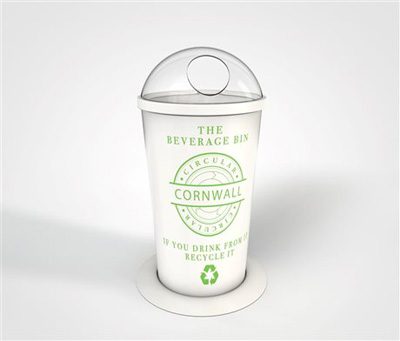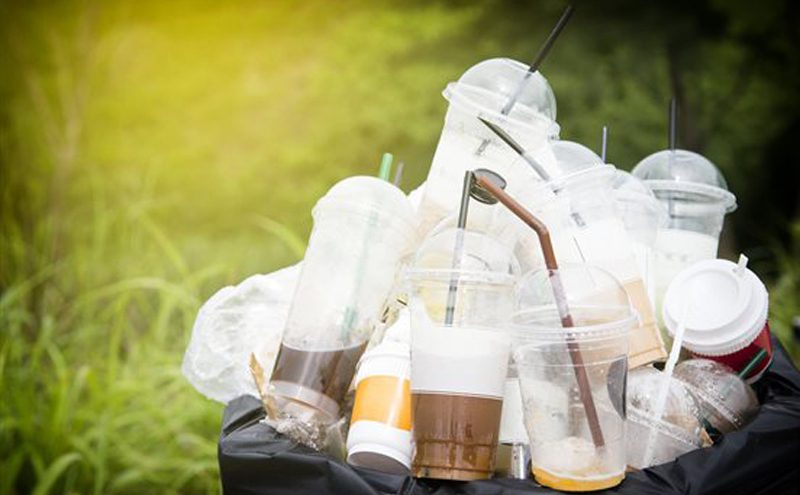
Closed Loop scheme aims to establish the viability of a new ‘Beverage Bin’ for single-use containers
In direct response to the 5p bottle tax and the threat of an imposed 25p ‘latte levy‘ on coffee cups, a new project will begin later this year in Cornwall to establish the viability of a radical new ‘Beverage Bin’. “Unlike any other bin system in existence,” says an announcement from the group behind it, “the Beverage Bin will accept all types of single-use drinks containers, including paper and plastic cups, cans, cartons, plastic bottles and even lids and straws, thereby eliminating consumer confusion, capturing more waste and boosting recycling rates.”
The project is being led by circular economy practitioner Closed Loop Environmental Solutions and Cornish product design and manufacturing firm ashortwalk, with support from Circular Cornwall and the new Global Centre for Circular Economy at the University of Exeter, Falmouth. Two hundred of the new bins will be carefully sited in various different ‘on-the-go environments’ across Cornwall, including high streets, beaches, transport hubs, venues and leisure attractions. Over a three month period, from June to August 2018, the bins will be monitored to understand how intuitive they are to use, how the composition of used beverage packaging changes in different environments, whether contamination can be reduced, and what the final design of the bins should look like.
Mobile engagement
A strong consumer engagement campaign will be supported by a mobile gamification app that will reward consumers for depositing their used drink receptacles. The material from the bins will be sorted locally, to analyse the material collected, before onward forwarding for processing at existing sites in the UK.
The end objective of the project is to determine whether, with a wider availability of Beverage Bins, this solution will support much needed investment in collection and sortation infrastructure for Cornwall, that also could be replicated across the whole of the UK.
“In consultation with food and drinks brands and the packaging industry over the last six months, there is now a broad acceptance that more needs to be done, with dialogue quickly progressing to practical solutions that address the issues of packaging waste”, says Peter Goodwin, Director of Closed Loop. “The Beverage Bin Project is the direct outcome from these discussions for which we now hope to raise the required funding to make happen – particularly at a time when the consumer is more willing than ever to participate”, added Peter.

Home economics
Matthew Thomson, Chief Executive of Fifteen Cornwall and the Cornwall Food Foundation, and the Co-Chair of The Cornwall and Isles of Scilly Local Nature Partnership, said he thought this was a much needed initiative for the far South West. “Nowhere in the British Isles feels the effect of ocean plastics more than we do here in Cornwall”, said Thomson. The entirety of Cornwall’s waste is currently shipped to other parts of the UK, he said, “so we desperately need a radical new solution that not only attracts the support of consumers but leaves a lasting recycling legacy for the county.” He urged the on-the-go drinks industry, Cornish business and the public to get behind the scheme, adding: “If this trial works in Cornwall, it can work anywhere.”
As well as introducing a new bin, the group behind it said the success of the project would also help validate a move away from the current weight-based measurement of recycling performance towards one based more on value. This is one of the key reasons why lighter streams have previously received less attention despite their huge numbers. Value will be realised through the ability of local Cornish based manufacturers, such as ashortwalk, to use this recovered resource as a valuable raw material to meet the anticipated increased consumer demand for recycled, closed-loop products.








